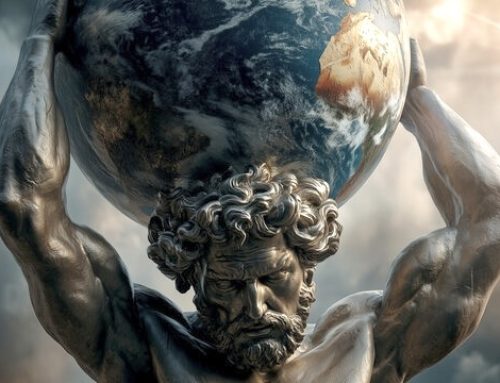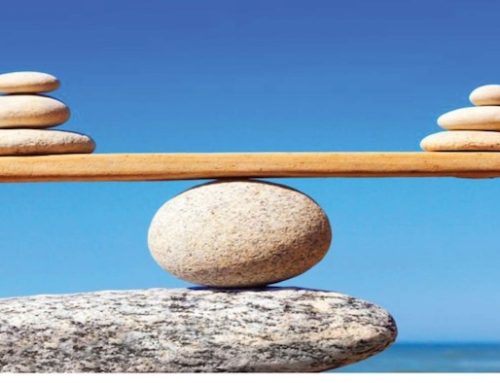If humankind survives, someday historians and eventually, archaeologists, will look back at today to wonder how a society that had largely achieved all of its ambitions—that successfully achieved an abundance of prosperity—went to war with itself. That some external threat or cataclysmic event did not do them in; rather, that they defeated themselves. They will study how the greatest empire in the then-modern era—the United States of America—imploded. Jared Diamond’s, Collapse: How Societies Choose to Fail or Succeed (2005), that covered the last 15,000 years of history may be followed by Stupidity: How the Smartest Society in the Anthropocene Epoch Imploded.
Each weekday, I rise and turn on the financial markets as reported by Bloomberg Television. I am interested in financial markets, but the real reason I tune in is that it is the only news outlet where the actual news is told without being coated in bias and deceit. All they care about is how the actual news impacts capital markets. They are realists in the spirit of Niccolo Machiavelli as opposed to spin artists pursuing eyeballs and ears with righteous ideological blather. Fox, MSNBC, CNN, Facebook, X, et al, which have far larger audiences will, no doubt, be one factor cited in future cultural analysts’ assessments as prime contributors to the implosion. Financial news outlets are not, however, completely innocent. They are simply assisting wealthy folks and institutional investors in their exploitation of market inefficiencies. Financial opportunity exists in both functional and dysfunctional societies.
As financiers and traders hope, the upcoming election will produce gridlock in Washington D.C. People who make money for a living in capital markets know that the market manipulations, represented by Trump and Harris including his macho “tariff man” bluster and her anti-free market “price gouging” controls, are economically unsound. Capitalists want a congress addled by pettiness to get none of these market manipulations passed. They recognize the benefits of political constipation.
Capitalists also know that a U.S. deficit that is approaching $40 trillion dollars in 2025 is only sustainable as long as the U.S. dollar is the world’s reserve currency. The dollar’s days as such will not last forever. I first studied and wrote about moving to a single global currency in 2008, well before cryptocurrency. My analysis showed that notwithstanding the risk to the U.S. of a non-dollar single global currency, the benefits to both world security and economic stability far outweighed protecting the dollar. My argument then (and now) is that the U.S. needs to embrace the idea to affect a soft landing for the dollar; to manage the transition rather than risking its inevitability. Today, we have cryptocurrency that is the obvious instrument to affect this transition. While much maligned by traditional bankers and politicians, it has the potential to deliver a legitimate global currency beyond the reach of central bank manipulation making it a more stable medium of exchange than the dollar.
Allowing our debt to ratchet higher—in spite of all of our other sources of power—will compromise America’s hegemony and allow the endemic deceit-driven negativity and avarice of our society to tip the U.S. toward implosion. Of course, the solution for the deficit is simple: raise taxes and reduce expenses for decades to come. But we don’t have the character and attendant will power for anything that is simple and clear. We are too immersed in delusion while staring at our loveliest selves on our social media feeds. Omphalos syndrome— the belief that a place of geopolitical power and its currency is the most important place in the world—is our most fundamental delusion. In Greek mythology omphalos represented the naval of the earth. In other words, as a syndrome, naval-gazing is not a particularly healthy condition for world leadership, especially when your own house is not in order.
As the saying goes, “in a democracy you get the government you deserve.” This election, as illustrated through the partisan avatars of Trump and Harris, is actually a reflection of who we are as a people today: profoundly selfish and divided against ourselves. Our allies grimace while our enemies drool. Indeed, as another old saying goes, “we have met the enemy and he is us.”
Largely because of our social media ideosphere and corrupt/deficient/compromised political leaders, reasonable fact-based discourse that favors consensus-driven problem solving that is both inclusive and optimistic has been set aside for fear, hate, violent, and shame-based rhetoric. This rhetoric is aimed at manipulation in the interest of swindlers rather than persuasion meant to serve the common interests and purposes of a stronghold society. Our founding fathers, in particular Alexander Hamilton and James Madison in The Federalist Papers (Federalist no. 9 & 10, respectively), repeatedly warned us of the danger of factions who prefer passion over reason; in today’s vernacular, bullshit over reality.[i] But few of us study these cornerstones of civics and moral philosophy anymore. It has now been decades since they were required courses in student curricula. Optimism and high-mindedness that defined America’s character through the 20th century has been set aside in favor of deceit-driven negativity and avarice in the 21st century.
The manner in which we conduct our lives is so far from the character that produced the most powerful society in the history of the world that it will not take future historians or archaeologists long to write the story of the great implosion—as another chapter in the long history of how empires fail.
However, it is not too late to reclaim the moral high-ground. There is hope. What we can’t foresee may save us, but only if we add integrity of character back into the mix. The unforeseeable always drives history, and in our nation’s first two centuries, the unforeseeable has tilted in our favor. The reason it did was the American character.
My maternal grandfather was born in 1890. In his earliest days on the prairies of South Dakota, his family lived in a windowless sod house. He fought in World War I, raised a family during the Great Depression and World War II, and just three months after his death we landed a man on the moon—the rocket engines for which my father helped engineer. Was any of that foreseeable? Hardly. In my lifetime, the arc of history continued with advances in science and technology that produced enormous increases in the well-being of humankind. From basic vaccines to digital technologies to now the promise of quantum computing, artificial intelligence, and fusion-based sources of new energy—a trifecta of extraordinary potential. Just two generations after a sod house, we stand at the edge of unfathomable frontiers of human progress. None of it, foreseeable.
Americans have done amazing things, and can do amazing things again. In spite of ourselves, the quiet diligent explorers, inventors, and innovators of tomorrow may offer us a way out—to save us from ourselves. But we have to add back the advantage that our founders established in the late 18th century, that Tocqueville documented in the 19th century, and that 20th century generations actualized together with dramatic advances in science and technology. We must restore our character. The Roman playwright, Terence, adapted by the Roman poet, Virgil, argued that “Fortune Favors the Bold.” They were only partially correct. Substantial and sustainable prosperity favors those who are bold, but who also have high character. Who honor virtues with integrity.
Regardless of any potential breakthrough solutions, my plea today is that we must drop the mongering—of fear, hate, violence, and shame—to have a chance of doing the right thing together in unison. If we don’t shed these debilitating modalities, the unforeseeable will flip from hope to implosion. Further, that until we start thinking of each other instead of just ourselves, it is unlikely we will be little more than fodder for those future historians and archaeologists.
In their late-life correspondence, John Adams wrote to Thomas Jefferson questioning whether any great society could recover from its curse of prosperity and lost character. He asked, “Have you ever found in history one single example of a Nation thoroughly Corrupted—that was afterwards resorted to Virtue?”[ii] He pointed to Rome which in his assessment had been a “vast empire until it was felled by riches and luxury.”[iii] My sense is that America is at its tipping point and we will soon know if we can right our own ship, or fail as the Roman empire did. Our founders doubt us from the grave.
While we wring our hands and argue over the war between Russia and Ukraine and the future of NATO, or the conflicts between Israel and Iran, or the potential invasion of Taiwan by China, or the many other concerns beyond our borders, the most pressing issue is here at home: the collapse of the American character and the impending implosion of the greatest empire in the history of humankind, the United States of America. If we don’t focus on fixing ourselves all the other issues do not matter. We will have no influence over them, anyway.
In a few weeks we will (hopefully) all vote. Many of us may be holding our noses as we do so, but not voting is simply unacceptable for those of us who claim to be citizens. To be clear, we need look no further than a mirror to see who is responsible for both today and tomorrow. It is not just the politicians—including Trump and Harris—it is principally us. What emerges is our doing. What comes next is unforeseeable, but can once again save us as long as we couple extraordinary developments with a humble, compassionate, and determined sense of character.
[i] Hamilton, Madison & Jay, The Federalist Papers (New York: Penguin Group, First Signet Classic Printing 2003), p. 66-79.
[ii] John Adams to Thomas Jefferson, December 21, 1819, Founders Online National Archives, https://founders.archives.gov/documents/Adams/99-02-02-7287.
[iii] Jeffrey Rosen, The Pursuit of Happiness: How Classical Writers on Virtue Inspired the Lives of the Founders and Defined America (New York: Simon & Schuster, 2024), p. 214.






